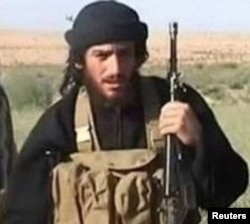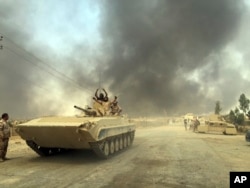Progress against the Islamic State terror group in Iraq and Syria could come at a cost for European countries, which fear returning foreign fighters could soon turn their wrath on their homelands.
IS has long put European countries in its crosshairs, “unambiguous” about its view of the continent as part of its larger battlefield, according to U.S. intelligence officials. And even the reported death of IS spokesman and external operations chief Abu Muhammad al-Adnani is unlikely to ease the threat.
“When you kill the head of the network, someone else steps in right away,” a Western diplomatic official told VOA on condition of anonymity. “The networks he had, the contacts he had are not going away.”
Instead, some European counterterrorism officials see the terror group’s waning fortunes overall as a possible trigger for a new, intense round of attacks.
“Certainly, in the short term it’s not going to be better,” warned Dutch National Coordinator for Security and Counterterrorism Dick Schoof.
IS losses in the Middle East “probably put a lot of pressure on the current foreign terrorist fighter to return,” he added.
'Substantial' threat
Schoof described the threat level as “substantial,” saying that while there are no specific indications of an imminent attack, authorities have found a growing number of links between jihadist networks and the Netherlands.
“They are more violent than ever. They are more radicalized,” he warned Monday at the Center for Strategic and International Studies in Washington. “They are certainly ISIS and they want to attack even when they are abroad.”
U.S. officials also are worried about a terror backlash as coalition forces penetrate further and deeper into what they describe as the heart of the Islamic State’s self-declared caliphate.
“Things that happen in Iraq and Syria resonate in other places, resonate in our capitals, Europe and other locations,” the commander of U.S. Central Command, Gen. Joseph Votel, told Pentagon reporters Tuesday.
“They will continue to try to either direct or support or potentially inspire attacks outside of the core in Iraq and Syria,” Votel said. “I think we should expect to see that.”
U.S. intelligence officials estimate of the more than 40,000 foreign fighters from more than 120 countries, about 7,000 hail from the West, with the vast majority of those coming from European nations.
Numerous foreign fighters
The Netherlands itself is paying close attention to its 260 foreign fighters, 180 of whom are still thought to be in Iraq and Syria. And officials also worry that some of those foreign fighters already have successfully used the migrant crisis to travel between Europe to Syria, helping to set up sophisticated and deeply-rooted networks.
“There are a number of ISIS operatives and ISIS cells active in Europe that took advantage of this,” Schoof said, using an acronym for the terror group.
Yet despite an intensive crackdown following the deadly November 2015 terror attacks in Paris and the more recent attack in Brussels, European officials remain wary.
“There are cells in Europe that we don’t know of, for sure,” a Western diplomat told VOA on condition of anonymity.
Intelligence officials worry that IS has been steadily growing bolder while using a mix of one-time former foreign fighters and new recruits. Investigators have even turned up evidence that IS operatives may have played a role in some less sophisticated but equally deadly attacks, like the one in Nice, France, this past July that killed more than 80 people.
There also is a high level of concern about the ability of IS to obtain and use forged documents to move operatives around.
Information sharing
To counter that threat, the European Union’s law enforcement agency (EUROPOL) and European intelligence agencies have been working with their U.S. counterparts, including the FBI and the Department of Homeland Security, to improve intelligence and information sharing.
“Instantaneous information is what we’re trying to build toward,” said U.S. Homeland Security Undersecretary for Intelligence and Analysis, Brig. Gen. Francis Taylor, who spoke Monday at CSIS. “Our partners need to know everything we know.”
In the case of foreign fighters, while not perfect, the information sharing seems to be making a difference.
“In many cases we know who they are, given the amount of intelligence we have, and the effective law enforcement and intelligence operations to determine what they are up to,” said Taylor.
Still, U.S. and European officials worry that with all the coordination and work that needs to be done, some IS foreign fighters will find ways to slip through the cracks and do damage back home.
“They can connect with the local radical groups and that can be a very toxic development,” warned the Netherland’s Schoof.






